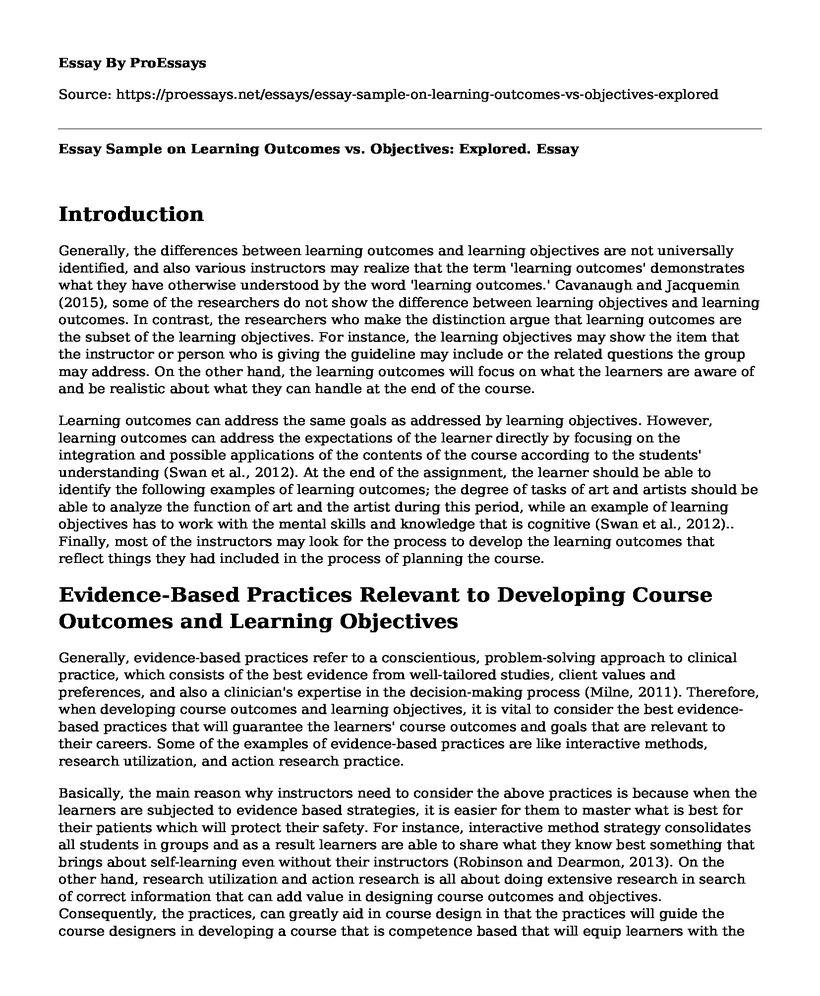Introduction
Generally, the differences between learning outcomes and learning objectives are not universally identified, and also various instructors may realize that the term 'learning outcomes' demonstrates what they have otherwise understood by the word 'learning outcomes.' Cavanaugh and Jacquemin (2015), some of the researchers do not show the difference between learning objectives and learning outcomes. In contrast, the researchers who make the distinction argue that learning outcomes are the subset of the learning objectives. For instance, the learning objectives may show the item that the instructor or person who is giving the guideline may include or the related questions the group may address. On the other hand, the learning outcomes will focus on what the learners are aware of and be realistic about what they can handle at the end of the course.
Learning outcomes can address the same goals as addressed by learning objectives. However, learning outcomes can address the expectations of the learner directly by focusing on the integration and possible applications of the contents of the course according to the students' understanding (Swan et al., 2012). At the end of the assignment, the learner should be able to identify the following examples of learning outcomes; the degree of tasks of art and artists should be able to analyze the function of art and the artist during this period, while an example of learning objectives has to work with the mental skills and knowledge that is cognitive (Swan et al., 2012).. Finally, most of the instructors may look for the process to develop the learning outcomes that reflect things they had included in the process of planning the course.
Evidence-Based Practices Relevant to Developing Course Outcomes and Learning Objectives
Generally, evidence-based practices refer to a conscientious, problem-solving approach to clinical practice, which consists of the best evidence from well-tailored studies, client values and preferences, and also a clinician's expertise in the decision-making process (Milne, 2011). Therefore, when developing course outcomes and learning objectives, it is vital to consider the best evidence-based practices that will guarantee the learners' course outcomes and goals that are relevant to their careers. Some of the examples of evidence-based practices are like interactive methods, research utilization, and action research practice.
Basically, the main reason why instructors need to consider the above practices is because when the learners are subjected to evidence based strategies, it is easier for them to master what is best for their patients which will protect their safety. For instance, interactive method strategy consolidates all students in groups and as a result learners are able to share what they know best something that brings about self-learning even without their instructors (Robinson and Dearmon, 2013). On the other hand, research utilization and action research is all about doing extensive research in search of correct information that can add value in designing course outcomes and objectives. Consequently, the practices, can greatly aid in course design in that the practices will guide the course designers in developing a course that is competence based that will equip learners with the required skills (Robinson and Dearmon, 2013). In conclusion, it has been established that course outcomes and objectives are deeply pegged on the type of teaching practices used in designing the course outcomes and objectives.
References
Cavanaugh, J. K., & Jacquemin, S. J. (2015). A large sample comparison of grade based student learning outcomes in online vs. face-to-face courses. Online Learning, 19(2), n2. https://eric.ed.gov/?id=EJ1062940
Swan, K., Matthews, D., Bogle, L., Boles, E., & Day, S. (2012). Linking online course design and implementation to learning outcomes: A design experiment. The Internet and Higher Education, 15(2), 81-88. https://www.sciencedirect.com/science/article/abs/pii/S1096751611000480
Milne, D. L., Sheikh, A. I., Pattison, S., & Wilkinson, A. (2011). Evidence-based training for clinical supervisors: A systematic review of 11 controlled studies. The Clinical Supervisor, 30(1), 53-71. https://www.tandfonline.com/doi/abs/10.1080/07325223.2011.564955
Robinson, B. K., & Dearmon, V. (2013). Evidence-based nursing education: Effective use of instructional design and simulated learning environments to enhance knowledge transfer in undergraduate nursing students. Journal of Professional Nursing, 29(4), 203-209. https://www.sciencedirect.com/science/article/abs/pii/S8755722312000786
Cite this page
Essay Sample on Learning Outcomes vs. Objectives: Explored.. (2023, Mar 27). Retrieved from https://proessays.net/essays/essay-sample-on-learning-outcomes-vs-objectives-explored
If you are the original author of this essay and no longer wish to have it published on the ProEssays website, please click below to request its removal:
- Essay Example: PowerPoint and a Student's Academic Performance in the Classroom
- My Life in College Essay
- Features Make the Person I Am Essay
- View Points on the American Standardized Tests
- Essay Sample on Teaching Learning and Assessment
- Essay Example on Cyberbullying: Analysis and Critical Interpretation
- Organize Time Efficiently: Set Clear Goals and Priorities - Essay Sample







